Published Dec 20, 2024 | 11:29 PM ⚊ Updated Dec 20, 2024 | 11:30 PM
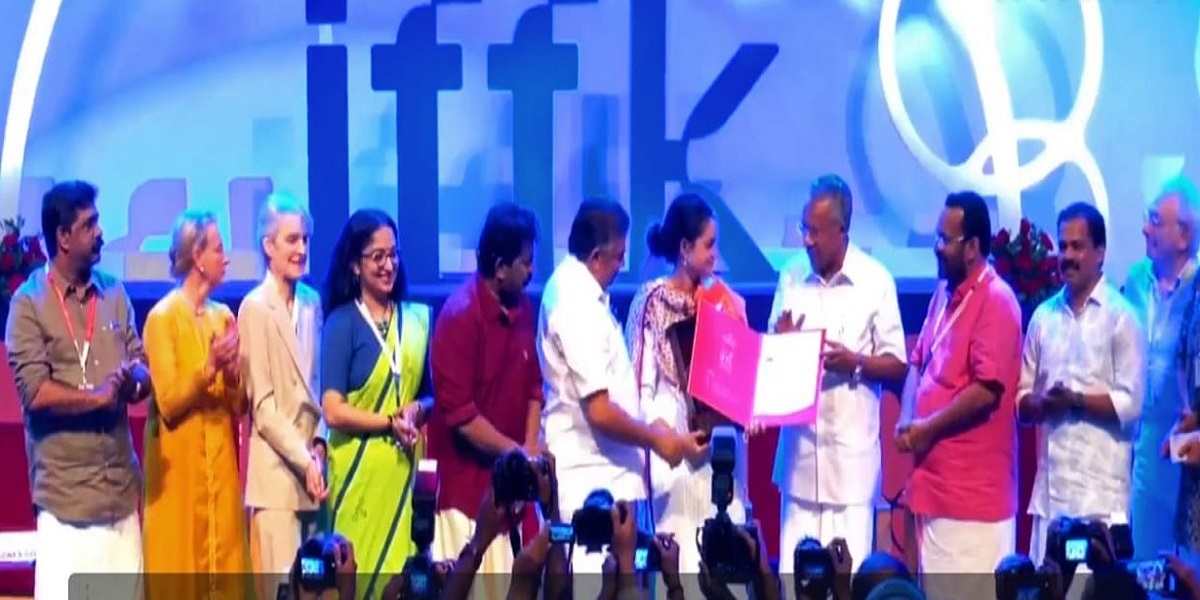
The highlight of the evening was the Spirit of Cinema Award, presented to filmmaker Payal Kapadia for her Cannes-winning masterpiece, All We Imagine as Light.
The curtains fell on the 29th International Film Festival of Kerala (IFFK) after seven days and nights of cinematic celebration. The festival saw 177 films from 68 countries. Over 13,000 delegates and 100 filmmakers were in attendance.
The festival, held in state capital Thiruvananthapuram, had screenings under different categories — Malayalam Cinema Today, Indian Cinema Now, World Cinema, and Festival Favorites. There were niche sections like The Female Gaze, Latin American Cinema, and Restored Classics.
Chief Minister Pinarayi Vijayan addressed the valedictory function at the Nisagandhi Auditorium, emphasising the festival’s dedication to women’s empowerment and the exploration of diverse themes such as fascism, queer rights, and environmental issues.
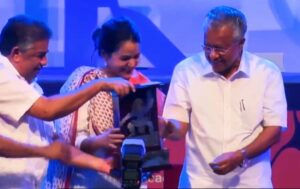
Spirit of Cinema Award, presented to filmmaker Payal Kapadia for her Cannes-winning masterpiece, All We Imagine as Light
“I hope the new generation embraces cinema with relevant and bold subjects,” he remarked.
The highlight of the evening was the Spirit of Cinema Award, presented to filmmaker Payal Kapadia for her Cannes-winning masterpiece, All We Imagine as Light.
Ministers Saji Cherian, and K Rajan, along with Kerala State Film Academy Chairman Premkumar, were present at the grand closing ceremony.
The prestigious Suvarna Chakoram (The Golden Crow Pheasant) for Best Film, along with a cash prize of ₹20 lakh, was awarded to the Brazilian movie Malu, directed by Pedro Freire.
This evocative drama deals with the intergenerational impact of trauma, centered on the complex relationships between Malu, her mother, and her daughter.
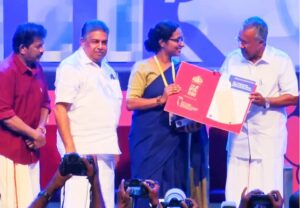
The FFSI K.R. Mohanan Award for Best Debut Director from India has been presented to Indulakshmi for her film Appuram.
The Rajata Chakoram (The Silver Crow Pheasant) for Best Director was awarded to Jesse Thomas Cook for The Hyperborean. This Canadian film is a unique blend of comedy, horror, and science fiction.
The FIPRESCI awards (from a global network of film critics and journalists) honored Sivaranjini for her film Victoria, which won both Best Film and Best Director awards.
The NETPAC (Network for the Promotion of Asian Cinema) award for Best Asian Film has been awarded to Me, Maryam, The Children And 26 Others, directed by Farshad Hashemi.
In the Malayalam category, the NETPAC award for Best Malayalam Film has gone to Fazil Muhammed for his film Feminichi Fathima, with a special mention given to Midhun Muralee for his movie Kiss Wagon.
The FFSI KR Mohanan Award for Best Debut Director from India has been presented to Indulakshmi for her film Appuram, while Fazil Muhammed received a special mention for Feminichi Fathima.
In a commendable initiative, Kerala State Film Academy Chairman Premkumar paid tribute to sanitation workers at the Kerala International Film Festival, an event being held under the Green Protocol to promote eco-friendly practices and eliminate plastic usage.
The acknowledgment came during the opening of a stall by the District Sanitation Mission at Tagore Theatre, part of the broader ‘Garbage-Free Kerala’ campaign.
Premkumar emphasised the invaluable contributions of sanitation workers and Haritha Karma Sena members in upholding cleanliness across festival venues while strictly following the Green Protocol.
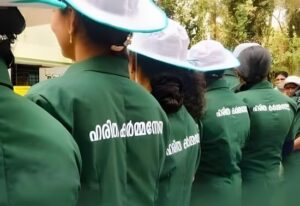
Kerala State Film Academy Chairman Premkumar paid tribute to sanitation workers at IFFK.
One of the most attended sessions at the 29th IFFK was a conversation with Spirit of Cinema honoree Payal Kapadia.
The acclaimed filmmaker, known for her global recognition as the first Indian filmmaker nominated for the Golden Globes, discussed her latest work, All We Imagine As Light.
Kapadia shared insights during an engaging dialogue with Dr. Divya S. Iyer, IAS, Director of the Cultural Affairs Department, and H Shaji, Deputy Director (Festival), KSCA.
She expressed gratitude for the festival’s role in expanding her film’s reach and celebrated the inclusion of 52 films by women directors in the 177-film lineup. Kapadia also championed independent filmmakers and highlighted the need for stronger Dalit representation in cinema.
The standout feature of the 29th IFFK is Feminichi Fathima (Feminist Fathima), a Malayalam film helmed by Fazil Muhammed that has swept numerous awards. This cinematic work is meticulously crafted, with its very title signaling its purpose — to challenge patriarchy rooted in religious traditions.
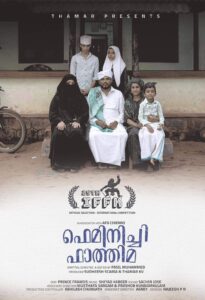
Feminichi Fathima.
The film boldly critiques the rigid orthodoxy of Muslim society and the patriarchal structures it fosters. Yet, it manages to walk a delicate line, presenting its critique in a manner that avoids offending religious sentiments.
In this regard, the film stands out as a rare example of questioning religious conservatism with finesse, delivering impactful messages through subtle yet effective humor.
Fazil’s thoughtful use of comedy enhances the film’s ability to provoke reflection while maintaining a balanced tone.
Even though the IFFK has garnered widespread appreciation, it continues to face criticism regarding accessibility for differently-abled delegates and filmmakers.
While ramps for differently-abled individuals are present, they are not available at all venues, and are often constructed in unscientific ways.
Dr. Siju Vijayan, a resilient and creative filmmaker from Arukutti, Alappuzha, has voiced his concerns about these persistent issues to South First.

Dr. Siju Vijayan at IFFK venue
Despite his need for a wheelchair for the past seven years due to spinal muscular atrophy, Dr. Vijayan has achieved remarkable feats in cinema. He was an active participant in the 29th edition of IFFK, where accessibility promises remained unfulfilled.
Dr. Vijayan’s debut feature film, Insha, a touching story of a 13-year-old girl in a wheelchair dreaming of seeing the sea, was previously screened at the festival.
His upcoming film, Return to Kashmir, currently in post-production, spans locations from Dhanushkodi to Kashmir, portraying the journey of a Kashmiri Pandit returning home after 30 years of exile.
(Edited by Rosamma Thomas)

